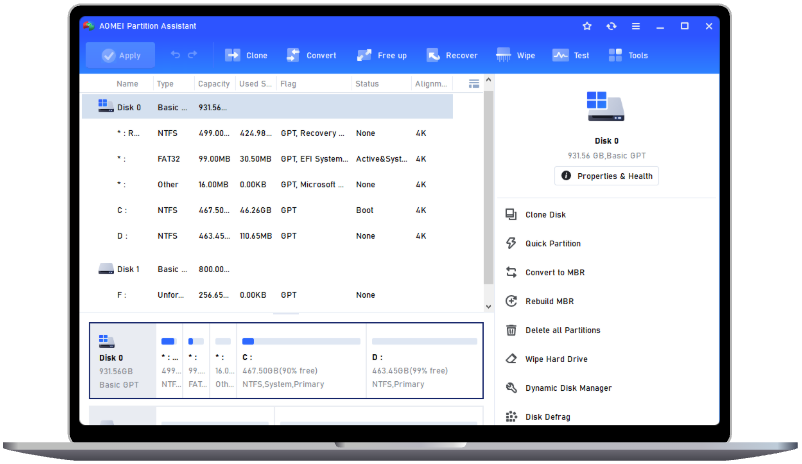Will Windows 11 Work on My Computer?
Upgrading to Win 11 for free is available for all compatible Windows 10 devices, but will Windows 11 work on my computer? Here is how to use Microsoft’s tool and a third-party alternative to check Windows 11 compatibility and what to do if your PC doesn’t meet the Windows 11 requirements.
What are the Windows 11 system requirements?
Windows 11 has been released by Microsoft for a period of time. Its new UI, smooth operation, and multiple features have attracted numerous users to upgrade the current system to Windows 11. Although most Windows 10 PCs will be able to upgrade to Windows 11, the installation process is not always successful and majority of users have encountered multiple problems like error code 0x80070070 or the "Can't install Windows 11" issue. That's why the question "Will Windows 11 work on my computer?" emerges on various forums.
Actually, Microsoft has officially illustrated all aspects of Windows 11 system requirements. Only the devices that meet the minimum requirements are qualified to run Windows 11 operating system.
1. CPU: Processor - 64-bit architecture at 1 GHz or faster; Intel - eight-generation or newer (details); AMD - Ryzen 3 or better (details); Qualcomm - Snapdragon 7c or higher (details)
2. RAM: 4GB or higher
3. Storage: 64GB or larger
4. System firmware: UEFI, Secure Boot
5. Graphic card: Direct X12 or later capable; WDDM 2.0 driver or newer
6. TPM: Trusted Platform Module (TPM) version 2.0.
7. Display: High-def (720p) display, larger than 9” diagonal in size, 8 bits per color channel (or better)
8. Internet connection: Windows 11 Home edition requires internet connectivity and a Microsoft Account (MSA) to complete device setup on first use
Will Windows 11 work on my computer?
As described above, if you want to run Windows 11 on your computer, you must meet the minimum requirements displayed above. But how to check if windows 11 will work on my computer? It's unnecessary to check them one by one manually. The below content will introduce you two Windows 11 requirements check tools: one is Microsoft PC Health Check tool, and the other is a professional disk manager.
▶ Option 1. Use Microsoft's PC Health Check app to see if your computer can run Windows 11
After demonstrating the strict hardware requirements for Windows 11, Microsoft also released a utility named PC Health Check Tool to help users check the compatibility of their current PC.
Step 1. Download the APP from Microsoft's official website.
Step 2. Install and open it. Click "Check now" in the main interface.
Step 3. If your computer is eligible, you will receive the following prompt: This PC can run Windows 11. Then, you can directly upgrade to Windows 11 and run it on your computer.
Step 4. However, if your computer is incompatible, you will get the warning: This PC doesn't currently meet Windows 11 system requirements. And you can click "see all results" to see which aspects are not available and click the links for more support.
▶ Option 2. Try AOMEI Partition Assistant to check Windows 11 compatibility
A free partition manager called AOMEI Partition Assistant Standard is a good alternative to the PC Health Check app. This software is designed for Windows 11/10/8/7/XP and Vista users. It should give you more information and details about various potential compatibility issues.
Step 1. Install and launch AOMEI Partition Assistant Standard. Click "Tools"> "Windows 11 Update Checker" on the top of the main console.
Step 2. Click "Start Check" to begin checking.
Step 3. In only several seconds, you can get the results. If your computer is not eligible for the Windows 11 system, AOMEI Windows 11 Update Checker will provide you with the relevant solutions by clicking the blue button.
Step 4. You can click "Fix it" to see the detailed tutorial about how to upgrade the incompatibility configuration. And some of them can be realized in AOMEI software, which could save a lot of time and effort.
What to do if my computer doesn't support Windows 11?
No matter which tool you apply to check "can I run Windows 11 on my PC", you can only upgrade to Windows 11 when your PC is compatible with the minimum requirements, otherwise, your request will be rejected. Once you find your computer doesn't support Windows 11, what should you do? The passage will show you two options.
▶ Option 1. Update to meet Windows 11 system requirements
Since Windows 11 will work on the computer that is eligible with the requirements, the first option is to update the incompatible configuration to meet the Windows 11 minimum system requirements. Among all the device configurations, some of them are easy to update, like extending C drive to get at least 64 GB storage space or enabling TPM 2.0. While some of them are difficult to fulfill such as the boot method and disk partition style. Therefore, the below content will teach you how to handle the biggest two hinders.
1. Convert MBR to GPT
From the Windows 11 requirements above, it is pointed out that the computer needs to support UEFI secure boot, which is suitable for the GPT partition style. So, the first step is to convert the MBR system disk to GPT and then change BIOS to UEFI.
Please note that Windows built-in tools like DiskPart and Disk Management only support converting an empty MBR disk to GPT, so you must delete all the partitions on the disk. But the biggest question is that you can't delete a running system disk. To bypass these limitations, we highly recommend you to use a versatile disk manager named AOMEI Partition Assistant Professional. Only in three clicks, you can realize MBR2GPT conversion without losing data and reinstalling Windows.
Now, you could download the demo version to ease the confusion that "can Windows 11 run on my computer".
Step 1. Install and open AOMEI Partition Assistant Professional, right click the MBR disk you want to convert, and select "Convert to GPT".
Step 2. In the pop-out window, you will be asked "Are you sure to convert the selected disk from MBR to GPT disk", click "OK" to continue.
Step 3. After a while, you will back to the main console, click "Apply" and you will find your disk style has been changed into GPT.
2. Change BIOS to UEFI
As we mentioned above, the last task is to change Legacy BIOS to UEFI to make partition style and boot mode compatible. Let's have a closer look.
Step 1. Start your computer and press the functional key (generally, it is F1, F2, F3, F10, or F12, ESC) to enter the firmware interface when you see the first screen. The functional key is different from computer to computer.
Step 2. Under the BOOT tab, choose the UEFI/BIOS Boot Mode, and change the Legacy to UEFI. Then save and exit the firmware interface.
Step 3. When it completes, go to "Settings" > "Update & Security" > "Check for Updates" and follow the prompts to upgrade to Windows 11.
▶ Option 2. Install Windows 11 from USB
If you you have lots of incompatible system conditions and think it’s laborious and complicated to update them one by one, another option is to install Windows 11 from a USB flash drive. This has nothing to do with partition schemes or boot mode. The steps are as follows:
Step 1. Download Media Creation Tool from the official website, install and run it, then choose "Create installation media(USB flash drive, DVD, or ISO file)".
Step 2. Choose which media to use (USB flash drive or ISO file) and finish other settings.
Step 3. When the bootable media gets ready, connect it to your computer, and restart your computer and boot from it.
Step 4. After finishing some settings, you will get into the Setup window, click "Install now".
Step 5. Follow the prompts to finish the next settings and wait patiently until Windows 11 installation completes.
By the way, you can also create a portable Windows 11 USB to enjoy Windows 11 on any device anytime and anywhere.
Conclusion
Will Windows 11 work on my computer? Now, you have known the answer from this passage. If your computer meets the Windows 11 minimum requirements, you can absolutely run Windows 11; if not, don't worry, two ways have been provided in this article to deal with it.
It's worth mentioning that AOMEI Partition Assistant is not only a Windows 11 requirements check tool but also a disk management tool that helps you convert MBR to GPT in a secure way so that you can successfully upgrade to Windows 11 directly. Moreover, if your PC runs slow one day, you can use it to free up more space by moving programs to another drive and get better performance by deleting large files or migrating OS to SSD.


